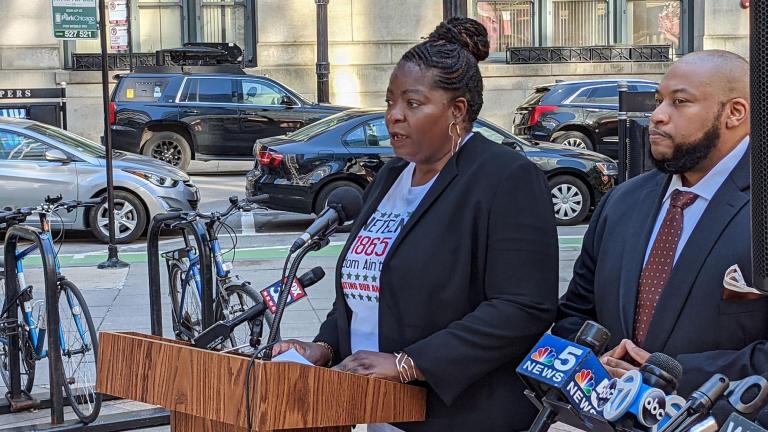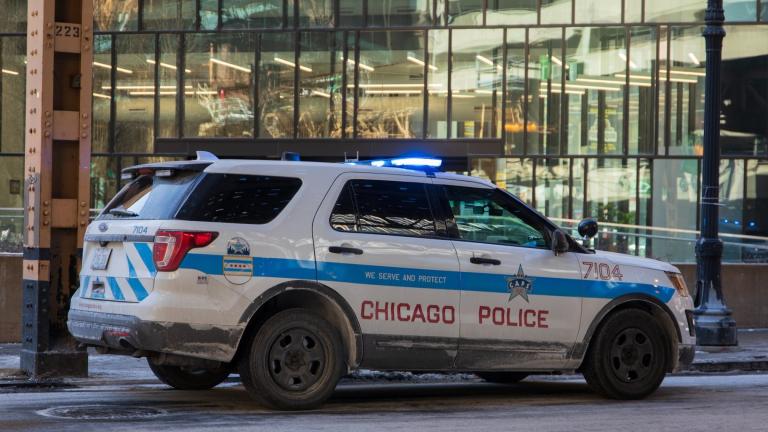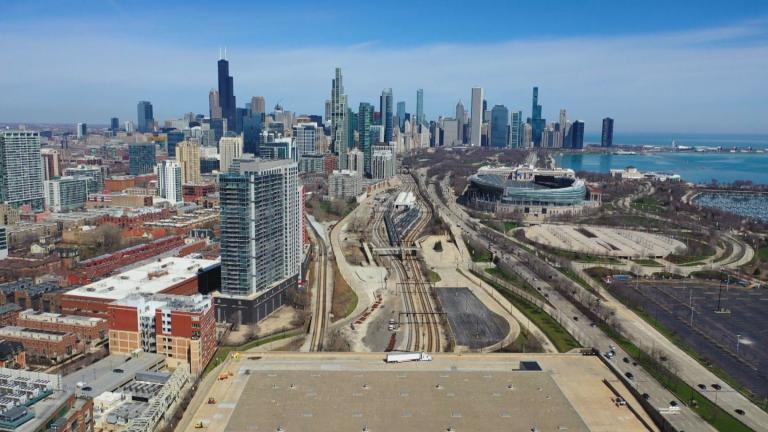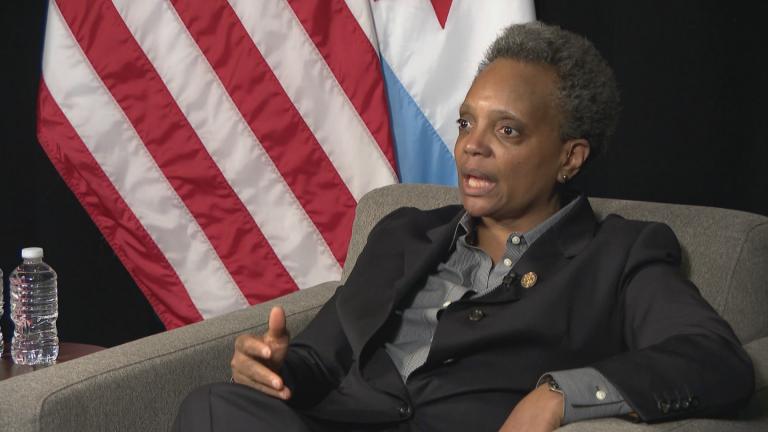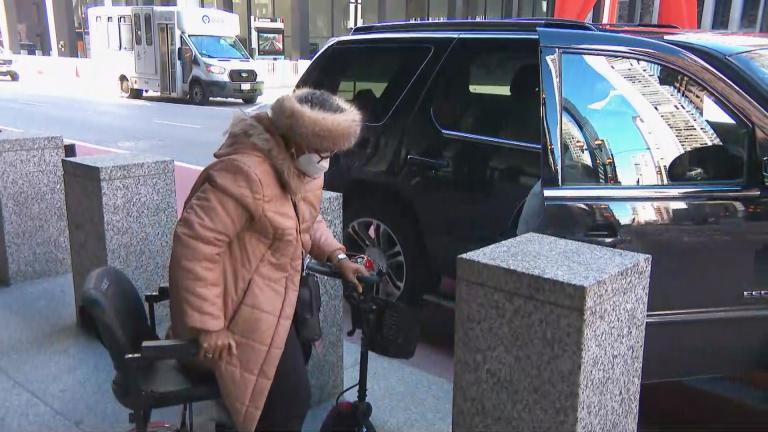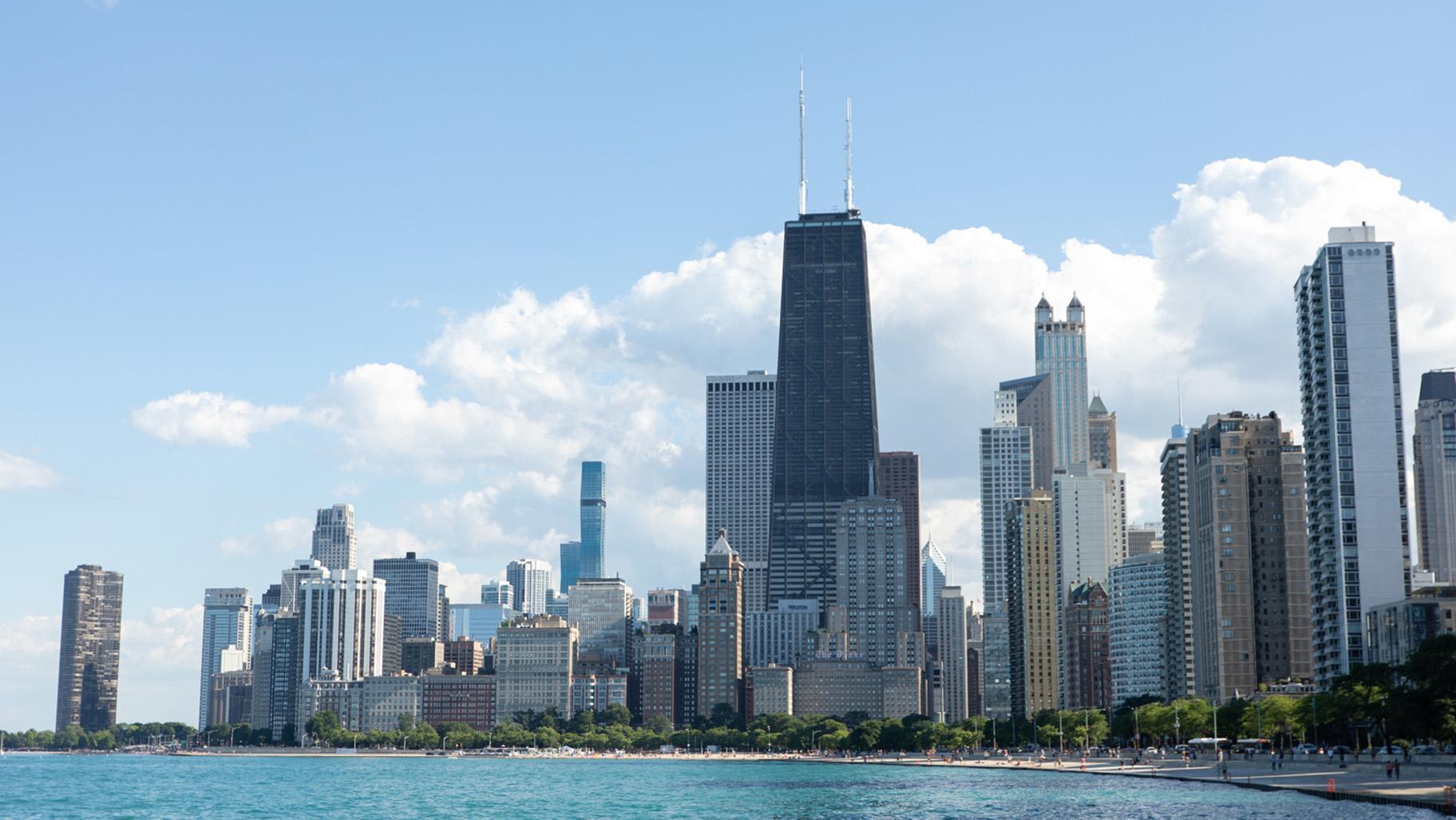 (Michael Izquierdo / WTTW News)
(Michael Izquierdo / WTTW News)
Mayor Brandon Johnson’s senior leadership team and his picks to serve on key panels with citywide authority are more racially diverse than the cabinets who advised his two predecessors, according to a WTTW News analysis.
Johnson tapped an equal number of men and women to serve in his cabinet and on boards and commissions with decision-making power during his first year in office, according to a WTTW News analysis.
In all, the 34 appointments Johnson made between May 2023 and April 2024 that require confirmation by the Chicago City Council reflect the city’s racial diversity, as measured by the 2020 census, more closely than the appointments made by his two predecessors, former Mayors Lori Lightfoot and Rahm Emanuel.
The second Black man elected Chicago mayor, Johnson tapped more Black Chicagoans to serve in positions of authority than Chicagoans of other races, according to WTTW News’ analysis.
Johnson told reporters that the diversity of his closest advisers is a source of pride and will help push through his progressive agenda — even as he said it draws fire from opponents of efforts to eliminate systemic racism and expand racial equity at Chicago City Hall.
“My cabinet is the most diverse cabinet, I believe, ever, or at least in 40 years,” Johnson said April 17.
The people of Chicago are 31.4% White, 29.9% Latino, 28.7% Black and 6.9% Asian, according to the 2020 U.S. census. The city’s workforce was 40% White, 29% Black, 26% Latino and 3% Asian American, according to city data.
Approximately 35% of the Chicagoans Johnson appointed to positions of power between May 2023 and April were Black. Another 26% were White, while 29% were Latino and 6% were Asian, according to WTTW News’ analysis.
Chief of Staff Cristina Pacione-Zayas said Johnson defines leadership more broadly than either of his predecessors and relies on his senior leadership team to execute his vision of co-governance, to create a more collaborative government to bridge the gap between government and community and disrupt long-standing mistrust between both groups.
Pacione-Zayas, who did not dispute WTTW News’ findings, said the Johnson administration had conducted its own analysis of the gender and racial breakdown of its senior leadership to ensure it fulfilled the mayor’s promises of equity and equal representation in city government.
Johnson meets with his full cabinet team every other week, and frequently one-on-one with department heads, Pacione-Zayas said.
“The mayor really believes that the sum of the whole is greater than the parts,” Pacione-Zayas said, calling Johnson’s approach to appointments “radically different” than the path chosen by Emanuel and Lightfoot.
During their first year in office, Lightfoot and Emanuel appointed more White Chicagoans to positions of authority than Chicagoans of other races, according to WTTW News analysis. Emanuel appointed significantly more men than women, while Lightfoot appointed slightly more men than women, despite being the first Black woman elected mayor, according to the analysis.
Sylvia Puente, executive director of the Latino Policy Forum, a Chicago advocacy group, said it was “refreshing” to see Johnson appoint so many Latinos to positions of real power at City Hall. Puente was highly critical of Lightfoot’s appointment record.
Four of the department heads appointed by Johnson are Latino, while eight other commissioners tapped by Johnson are Black. Two of Johnson’s picks to lead city departments are White men.
“There is some work to be done to get to parity with department heads,” Puente said. “But overall, Johnson has elevated Latino leadership to levels previously unseen in Chicago.”
While noting there is room for improvement, Puente said she admired and appreciated Johnson’s deliberative approach to ensuring his leadership team is diverse and rooted in Chicago’s neighborhoods.
Use of Deputy Mayors
While Johnson has been repeatedly criticized for being slow to fill key positions at City Hall, especially those in his cabinet, he appointed three more people to a City Council-confirmed position of authority than Lightfoot did in her first year in office.
Emanuel made nearly 40% more appointments during his first year in office than both Johnson and Lightfoot, an indication that the structure of Chicago’s government has changed significantly since 2011. Much more power is concentrated in the office of the mayor, even though the City Council could overrule his or her actions.
Accelerating a trend that began under Lightfoot, Johnson appointed nine deputy mayors, who have his authority to act on a wide range of issues, including the migrant crisis, community engagement, community safety and labor relations. Those appointments do not require City Council confirmation.
Lightfoot had five deputy mayors when she left office.
In addition, Johnson has empowered the city’s chief operating officer to take a more active role at City Hall, while naming a communications director and chief strategy officer rather than a press secretary.
In all, Johnson named 17 people to serve as his closest advisors since taking office, with one — his first chief of staff, Rich Guidice — leaving before the mayor was set to celebrate his first anniversary. More than half of the people filling those positions are Black, and more than two-thirds are women, according to the WTTW News analysis.
That includes Chicago Department of Public Health Commissioner Olusimbo “Simbo” Ige, a Black woman, who replaced Dr. Allison Arwady, who is White, as the city’s top health official.
Under a change in city ordinance approved by the Chicago City Council in 2021, Ige’s appointment did not require City Council confirmation. However, the City Council voted unanimously to approve a measure introduced by Ald. Bennett Lawson (44th Ward) to reverse that change, requiring Ige’s successors to be confirmed by the City Council.
Approximately 20% of Johnson’s senior leadership team is Latino, according to WTTW News’ analysis. That includes Pacione-Zayas, a Latina, who replaced Guidice, a White man, after he departed at the beginning of April.
Puente said she was particularly thrilled by Johnson’s decision to name Pacione-Zayas as chief of staff and make her the first Latina to hold the post.
“Her appointment is a key symbol of what we can all aspire to,” Puente said, adding that she was Pacione-Zayas would serve as an inspiration to young Latinas across the city.
Chicago's Black population dropped approximately 10% between 2010 and 2020, while Chicago’s Latino population grew 5%, according to the 2020 census.
Asian Representation
No member of Johnson’s senior staff is an Asian Chicagoan, even though Chicago’s Asian American community grew by 31% between 2010 and 2020, according to the 2020 census.
Grace Pai, executive director of the Chicago chapter of Asian Americans Advancing Justice, said she was encouraged by Johnson’s decision to appoint Jianan Shi, an Asian Chicagoan, as president of the Chicago Board of Education.
“There’s definitely room for improvement, but it's still early in the administration,” Pai said. “I'm also glad that we have two elected Asian American (alderpeople) on City Council so that we don't have to rely solely on mayoral appointees to uplift Asian American priorities and experiences.”
Ald. Leni Manaa-Hoppenworth (48th Ward) and Ald. Nicole Lee (11th Ward) are only the second and third Asian Americans elected to the City Council in the city’s history. Lee is the first Chinese American to serve as alderperson and Manaa-Hoppenworth is the first Filipina City Council member.
“Asian Americans are amongst the fastest growing demographics in Chicago and the nation and I’m excited to be seeing an exponential increase in representation in local governments,” Manaa-Hoppenworth said in a statement that declined to criticize Johnson.
Lee, first appointed by Lightfoot to represent Bridgeport and Chinatown, did not respond to a request for comment from WTTW News.
Amisha Patel, a longtime activist who is Asian American, served as a senior adviser to Johnson’s transition team, but did not join his administration.
Just one of Johnson’s senior leadership team is a prominent member of Chicago’s LGTBQ+ community, Comptroller Chasse Rehwinkel.
Brian C. Johnson, CEO of Equality Illinois, the statewide LGBTQ+ civil rights organization, said he was concerned by the under representation of gay, lesbian, bisexual, transgender and queer Chicagoans on Johnson’s leadership team, but did not doubt Johnson’s support for LGBTQ+ Chicagoans.
“When LGBTQ+ people are not at senior decision-making tables, the city loses out on the opportunity to benefit from the incredible talents and experiences of LGBTQ+ leaders,” Johnson said in a statement. “Furthermore, as a community that is more over-policed, less healthy, more likely to be victims of violent crimes, less economically stable, and less likely to have a college degree than our straight and cisgender peers; we need to be in the rooms where key policies about our city are formed and implemented.”
In December, the City Council’s Latino Caucus objected to the fact that three high-profile appointments made by Johnson to lead departments did not include any Latino Chicagoans. In a statement, the caucus’ members said they were “extremely disappointed that once again no Latinos were appointed.”
Ald. Andre Vasquez (40th Ward) took to social media to warn the mayor he needed to make more of an effort to put Latino leaders in positions of authority in his administration.
The appointments of Lisette Casteñeda as commissioner of the Department of Housing and Jose Tirado as the head of the Office of Emergency Management and Communications quickly followed, muting that criticism.
Vasquez told WTTW News Wednesday that it was a “good sign” that Johnson’s appointments are in line with Chicago’s racial diversity.
“I’m happy to see it moving in the right direction,” Vasquez said.
Other Posts
Some of the city’s highest profile leaders appointed by the mayor do not require City Council confirmation and are not included in this analysis. Those positions include members of the Chicago Board of Education and the leaders of the city’s sister agencies.
Johnson replaced all but one member of the CPS board in July, and named Shi, who is Chinese, president.
Johnson did not replace CPS CEO Pedro Martinez, who is Latino, and Chicago Fire Department Commissioner Annette Nance-Holt, who is Black, as well as Streets and Sanitation Commissioner Cole Stallard, who is White. All were appointed by Lightfoot. Johnson has also kept Aviation Commissioner Jamie Rhee in place. Rhee, who is White, was appointed by Emanuel and was kept on by Lightfoot.
Johnson has also not moved to replace City Colleges of Chicago Chancellor Juan Salgado, who is Latino; Chicago Transit Authority President Dorval Carter, who is Black, Chicago Park District CEO Rosa Escareño, who is Latina, and Chicago Housing Authority CEO Tracey Scott, who is Black, or any of the members of the CHA Board.
Salgado was appointed by Emanuel in 2017, and Carter was appointed by Emanuel in 2015. Escareño and Scott were appointed by Lightfoot.
None of those appointments required City Council confirmation.
Johnson has not named a new executive director of the Public Building Commission, which was led by Executive Director Carina Sánchez, who is Latina, until November.
This analysis does not include appointments Johnson made to a variety of advisory councils designed to make recommendations to her administration that require City Council confirmation. However, those boards and commissions have no policymaking authority and serve a largely ceremonial role.
It also does not include the seven people Johnson appointed to serve on the Community Commission for Public Safety. While those appointments were announced Tuesday, they will not be formally introduced to the City Council until May 22 — after Johnson’s first anniversary in office.
Contact Heather Cherone: @HeatherCherone | (773) 569-1863 | [email protected]

